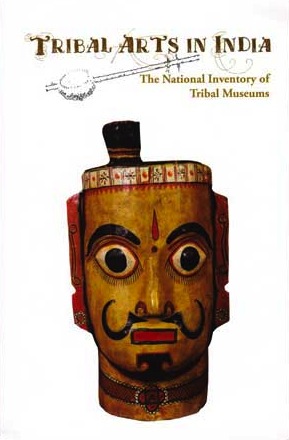
Tribal Arts in India | Worldcat.org >>
Free eBooks & Magazine by Bhasha Research and Publication Centre: Adivasi literature and languages >>
The official “Know India: National Portal of India” maintained by the Government of India distinguishes between folk and rural art in general, and tribal art by referring to “another form of traditional art” in particular:
The [28 States and 8 Union Territories] sprawled across the country have their own distinct cultural and traditional identities, and are displayed through various forms of art prevalent there. Every region in India has its own style and pattern of art, which is known as folk art. Other than folk art, there is yet another form of traditional art practiced by several tribes or rural population, which is classified as tribal art. The folk and tribal arts of India are very ethnic and simple, and yet colorful and vibrant enough to speak volumes about the country’s rich heritage. […]
Tribal art, like folk art, has also progressed considerably due to the constant developmental efforts of the Indian government and other organizations. Tribal art generally reflects the creative energy found in rural areas that acts as an undercurrent to the craftsmanship of the tribal people. Tribal art ranges through a wide range of art forms, such as wall paintings, tribal dances, tribal music, and so on.
Source: Folk and Tribal Art – Culture and Heritage
http://india.gov.in/knowindia/folk_tribalart.php
Date Visited: 20 May 2011
“We are so much more than that. We follow a tradition rich in music, dance and love.” – Author Swarnalatha who runs an NGO that works for the upliftment for people of her Irula community >>
Up-to-date reports by Indian journalists and commentators
To search Indian periodicals, magazines, web portals and other sources safely, click here. To find an Indian PhD thesis on a particular tribal community, region and related issues, click here >>
Search tips
Combine the name of any particular state, language or region with that of any tribal (Adivasi) community.
Add keywords of special interest (music, poetry, dance just as health, sacred grove and biodiversity); learn about the rights of Scheduled Tribes such as the “Forest Rights Act” (FRA); and the United Nations “Declaration on the Rights of Indigenous Peoples”, “Universal Declaration of Human Rights”, “women’s rights”, or “children’s right to education”.
Specify any other issue or news item you want to learn more about (biodiversity, bonded labour and human trafficking, climate change, ecology, economic development, ethnobotany, ethnomedicine, global warming, hunter-gatherers in a particular region or state, prevention of rural poverty, water access).
For official figures include “scheduled tribe ST” along with a union state or region: e.g. “Chhattisgarh ST community”, “Himalayan tribe”, “Scheduled tribe Tamil Nadu census”, “ST Kerala census”, “Particularly Vulnerable Tribal Group Jharkhand”, “PVTG Rajasthan”, “Adivasi ST Kerala”, “Adibasi ST West Bengal” etc.
In case the Google Custom Search window is not displayed here try the following: (1) toggle between “Reader” and regular viewing; (2) in your browser’s Security settings select “Enable JavaScript” | More tips >>
Note: hyperlinks and quotes are meant for fact-checking and information purposes only | Disclaimer >>
Find publications by reputed authors (add “open access” for freely downloadable content)
See also
Adivasi Academy & Museum of Adivasi Voice at Tejgadh
Atree.org | Ashoka Trust for Research in Ecology & the Environment (posts)
Biodiversity | Hyderabad biodiversity pledge | Nilgiri Biosphere
eBook | Background guide for education
Explore India’s tribal cultural heritage with the help of another interactive map >>